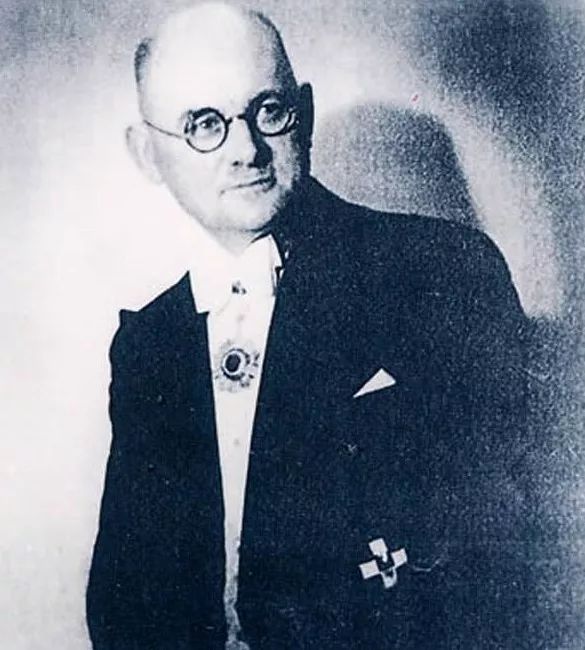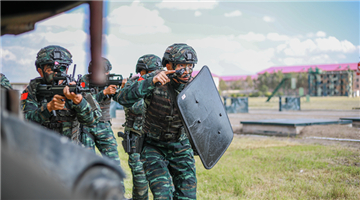
NANJING, Aug. 26 (Xinhua) -- For decades, Hamburg-born John Rabe has been a household name in Nanjing, a Chinese city thousands of kilometers away from Germany that was traumatized by a massacre during World War II.
Around 20,000 people visit the late German businessman's former residence each year in bustling downtown Nanjing, capital of east China's Jiangsu Province. The two-story Western-style building is now a museum in memory of Rabe.
Visitors were attracted by the undying story of how Rabe and a dozen of other foreigners had set up the Nanjing Safety Zone, taking in and saving more than 200,000 Chinese during the heinous massacre by the invading Japanese troops in the late 1930s.
HERO OF NANJING
On Dec. 13, 1937, the Japanese troops captured Nanjing. In the following six weeks, they slaughtered more than 300,000 Chinese civilians and unarmed soldiers in one of the most barbaric episodes of WWII, known as the Nanjing Massacre.
Regarded as the "Oskar Schindler of China," Rabe, a business representative of Siemens, risked his life to save Chinese who were unable to flee.
Rabe and several other foreigners established an international safety zone housing more than 20 shelters. His courtyard alone concealed and protected over 600 Chinese people.
"He once saw several Japanese soldiers drag some Chinese women into a house and attempt to rape them. Disregarding his own safety, Mr. Rabe went straight forward, grabbed the Japanese soldiers from the back and pushed them out of the house," said Jing Shenghong, a history professor at Nanjing Normal University.
When Rabe was called back to Germany in early 1938, he took with him a 10-volume diary that recorded the atrocities of the Japanese invaders.
On Dec. 14, 1937, Rabe wrote, "For each 100 to 200 meters that our car drove, we would see several corpses along the way, all of them civilians..."
Rabe's diary was unveiled to the public by his granddaughter in 1996, more than 40 years after his death. It has become an important historical resource in the study of the massacre. Subsequently, his deeds became widely known across China.
While addressing a state commemoration for China's first National Memorial Day for Nanjing Massacre Victims in 2014, Chinese President Xi Jinping expressed thanks to the foreigners including John Rabe who protected Nanjing residents and recorded the atrocities of the Japanese invaders despite risks.
"The Chinese people will never forget their humanitarian spirit and brave and righteous acts," Xi said.
To cherish the memory of Rabe, various exhibitions were held across China. In September 2019, an exhibition on Rabe opened at the Museum of the War of Chinese People's Resistance Against Japanese Aggression in Beijing.
A total of 151 historical photos were on display at the exhibition, which detailed the Rabe family, his life in China and his contribution to Sino-German relations.
Jan. 5 of this year was Rabe's 70th death anniversary. On that day, many Chinese working or living in Germany came to pay homage to Rabe at a cemetery in Berlin, where they laid out flowers, tidied up the tombstone and mourned for this Chinese friend.
"Seventy years on, many people still rally at Rabe's tomb in remembrance of him. When a man does a great thing, people will never forget him," Ju Zhengji, a Chinese doctorate student of history at Free University of Berlin, said at the memorial.
INDISSOLUBLE BOND
Rabe arrived in China in 1908 at the age of 26. Some of his offspring were born in China. He and his family had lived in the cities of Beijing, Tianjin and Nanjing for nearly 30 years.
Over the past eight decades, Rabe's family has kept an indissoluble bond with China.
On Sept. 2, 2015, China awarded medals to 30 Chinese and foreign veterans and civilians who fought for China in WWII, as part of the country's celebrations marking the 70th anniversary of its victory in the Chinese People's War of Resistance against Japanese Aggression. Thomas Rabe, Rabe's grandson, received the medal in Beijing. He said this award belonged to his grandfather.
Early this year when the COVID-19 pandemic was raging in Germany, Thomas Rabe, a doctor at the Heidelberg University Hospital, told Chinese embassy there that his family and the local hospitals were short of protective supplies and medicine.
Nanjing wasted no time taking action.
The Memorial Hall of the Victims in Nanjing Massacre by Japanese Invaders approached the sole producer of chloroquine phosphate in China to purchase the tablets, a conventional drug for malaria but was believed useful in treating the coronavirus disease.
Guangzhou Baiyunshan Guanghua Pharmaceutical Co., Ltd., based in south China's Guangdong Province, immediately donated 600 tablets of chloroquine phosphate to the Memorial Hall.
Jiangsu Carephar Pharmaceutical Co., Ltd. also helped buy 600 bottles medicine that can be used on at least 1,500 COVID-19 patients.
"There is an old saying in China: The grace of dripping water deserves being reciprocated with a gushing spring," said Qin Yinlin, chairman of the board of Carephar, "not to mention that the Rabes have given great kindness to us."
In April, the donated medicine and protective gears from China were sent to Heidelberg. The supplies, including 30,000 masks, 200 protective suits and medicine, were delivered through a chartered plane.
The Chinese embassy in Berlin promptly took care of the customs clearance procedure and sent the supplies to Heidelberg within one day after a 700-km drive from Berlin.
Thomas Rabe said the help from China made him realize that "China will never forget to give friends a helping hand."
Last year, Christoph Reinhardt, great-grandson of John Rabe, took his daughter to Nanjing so that the young lady could learn more about her forefather.
Reinhardt believes the pursuit of peace and love should always be inherited by future generations.
His view was echoed by Zhang Jianjun, curator of the Memorial Hall in Nanjing.
"I hope everyone can champion peace while bearing history in mind, so as to carry forward the kindness, courage and integrity tested by life and death more than 80 years ago," he said.











